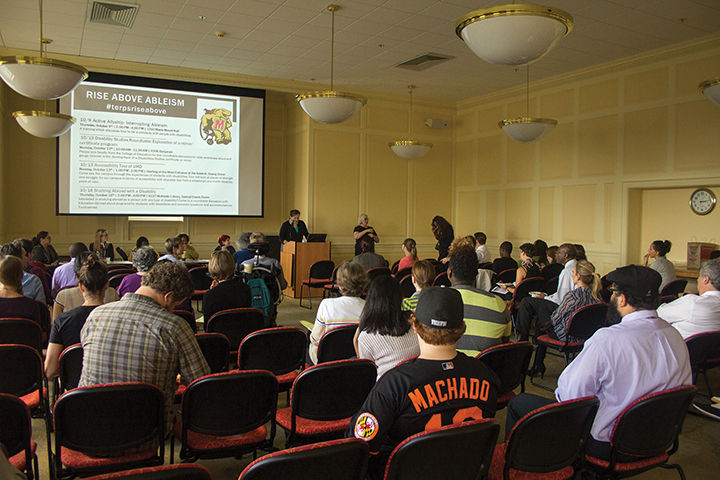As someone with a close relative who has an intellectual disability, Crystal Upperman said she believes society has an obligation to help everyone reach their full potential.
“As a public institution, we need to remain committed to creating an inclusive and supportive environment for all,” said Upperman, Graduate Student Government’s committee affairs vice president.
Upperman, a doctoral student in the marine-Estuarine environmental sciences program, said the GSG’s Diversity Committee has recently begun to make disability rights on the University of Maryland campus a priority within its initiatives.
READ MORE: Univ. of Md. to offer a disabilities studies minor, certificate program
The committee is planning a spring campaign to raise awareness for diversity issues, which will include disability awareness, Upperman said. She added that the GSG is also working to bring physical fitness classes to academic buildings as a part of its disability-focused initiatives.
“The thought behind this was not only for the well-being of able students but also for students that are not as mobile,” she said. “It’s a way to bring services closer to those in need.”
As the committee continues to address disability issues, Upperman said, one recent concern was the need for a full audit of bathroom accessibility across the campus.
“There may be a need for new signage on bathrooms that are labeled as handicap-accessible but do not meet such specifications,” she said.
Upperman credits some of the GSG’s push toward disability awareness to its close ties to disability awareness advocates, such as doctoral student Stephanie Cork.
Cork, who is studying kinesiology and currently sits on the committee, said she studies disability problems and works closely with the Office of Diversity & Inclusion and the President’s Commission on Disability Issues to further disability awareness and advocacy at this university.
READ MORE: Panel discusses Univ. of Maryland approach to disability studies
“On the whole, I am just looking to re-articulate disability into the work towards inclusive excellence on this campus, and this means moving from awareness events to advocacy,” Cork said. “My dissertation project will be an institutional ethnography that uses my work across this campus to locate the successes and failures of diversity as a central pillar to the success of any post-secondary institution.”
For the three years she has been at this university, Cork said, she has pushed to be a part of disabilities-oriented projects, adding that seeing the GSG start to tackle disability awareness in its initiatives is a plus.
This push for diversity, Cork said, will be inclusive of all groups of students, including international students, students of color, students from different class backgrounds and LGBTQ+ students.
“Diversity though intersectionality is the name of the game, and we need to push harder and not leave groups behind,” she said.
Paul Jaeger, an information sciences professor at this university’s information studies school, said numerous people in his field conduct research on disability issues in terms of designing new technology that is accessible to everyone.
“It’s not something that we just started working towards, but it’s something we’re continuing to build on,” Jaeger said. “We’ve expanded on it over the years.”
READ MORE: UMD students discuss ableism and discrimination at disability event
With the large range of classes in the information studies school related to disabilities, students who get a degree from the school tend to learn about accessibility in technology, Jaeger said.
“Our college is strongly focused on diversity, and disability is a part of diversity,” he said. “We incorporate disability issues into our core so everybody who comes out of the program has some sort of knowledge on issues.”
For sociology professor Nancy Forsythe — who has a son with Down syndrome — improving disability rights on the campus is an important issue to tackle.
“Being academically inclusive for students with intellectual disabilities is sometimes a hard concept for people in higher ed to grasp,” Forsythe said.
Teaming up with organizations across the state and on the campus, such as Best Buddies, a nonprofit organization that promotes friendship and understanding for people with intellectual and developmental disabilities internationally, Forsythe said she is “beginning to see a reward” for disability awareness efforts and added that she thinks the The diversity and inclusion office’s push toward integrating students with disabilities into the university community is helping.
“We have given a series of Moving Maryland Forward grants over the last few years to build more social, academic programming around disability as identity,” said Beth Cohen, the office’s director of education and training.
Cohen noted various grants from the office have helped support TerpAccess Disability Network, which offers disability awareness training and events, and the development of the disability studies minor. Rise Above grants from the diversity and inclusion office have strengthened student programming and activism around issues of ableism on the campus, she added.
“We have also been excited to have partners in less-expected places such as Education Abroad, which is doing cutting edge and really great work around making accessible study-abroad possibilities for students,” she said.



